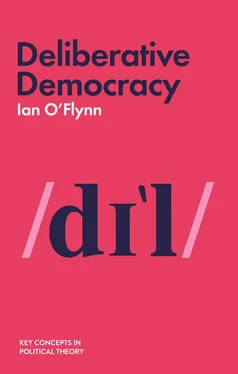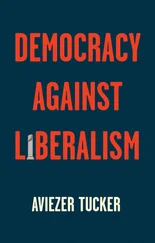1 Cover
2 Series Title
3 Title Page Deliberative Democracy Ian O’Flynn polity
4 Copyright Page Copyright Page Copyright © Ian O’Flynn 2022 The right of Ian O’Flynn to be identified as Author of this Work has been asserted in accordance with the UK Copyright, Designs and Patents Act 1988. First published in 2022 by Polity Press Polity Press 65 Bridge Street Cambridge CB2 1UR, UK Polity Press 101 Station Landing Suite 300 Medford, MA 02155, USA All rights reserved. Except for the quotation of short passages for the purpose of criticism and review, no part of this publication may be reproduced, stored in a retrieval system or transmitted, in any form or by any means, electronic, mechanical, photocopying, recording or otherwise, without the prior permission of the publisher. ISBN-13: 978-1-5095-2345-0 ISBN-13: 978-1-5095-2346-7 (pb) A catalogue record for this book is available from the British Library. by Fakenham Prepress Solutions, Fakenham, Norfolk NR21 8NL The publisher has used its best endeavours to ensure that the URLs for external websites referred to in this book are correct and active at the time of going to press. However, the publisher has no responsibility for the websites and can make no guarantee that a site will remain live or that the content is or will remain appropriate. Every effort has been made to trace all copyright holders, but if any have been overlooked the publisher will be pleased to include any necessary credits in any subsequent reprint or edition. For further information on Polity, visit our website: politybooks.com
5 Preface and Acknowledgements
6 Dedication
7 1 Deliberative Democracy Two basic criticisms Normative theory and empirical research Origins and revival What is deliberative democracy?
8 2 Deliberative Differences Freedom and equality Reason-giving Consensus The common good
9 3 Deliberative Mini-Publics Why mini-publics? Design issues Inclusion Participation Information Decision-making Agenda And what else?
10 4 Deliberative Systems Habermas’s two-track model Systemic rights and wrongs Warren’s problem-based approach
11 5 Pluralism and Deliberative Democracy Pluralism s Public reason and its critics Democracy in divided societies
12 6 Global Deliberative Democracy? Political cosmopolitanism Rawls’s law of peoples Habermas’s postnational constellation Dryzek’s contest of discourses Some brief concluding thoughts
13 References
14 Index
15 End User License Agreement
1 Chapter 3Table 3.1: Three types of mini-public
2 Chapter 6Table 6.1: Global deliberation or global deliberative democracy?
1 Cover
2 Table of Contents
3 Begin Reading
1 ii
2 iii
3 iv
4 vi
5 vii
6 viii
7 ix
8 x
9 1
10 2
11 3
12 4
13 5
14 6
15 7
16 8
17 9
18 10
19 11
20 12
21 13
22 14
23 15
24 16
25 17
26 18
27 19
28 20
29 21
30 22
31 23
32 24
33 25
34 26
35 27
36 28
37 29
38 30
39 31
40 32
41 33
42 34
43 35
44 36
45 37
46 38
47 39
48 40
49 41
50 42
51 43
52 44
53 45
54 46
55 47
56 48
57 49
58 50
59 51
60 52
61 53
62 54
63 55
64 56
65 57
66 58
67 59
68 60
69 61
70 62
71 63
72 64
73 65
74 66
75 67
76 68
77 69
78 70
79 71
80 72
81 73
82 74
83 75
84 76
85 77
86 78
87 79
88 80
89 81
90 82
91 83
92 84
93 85
94 86
95 87
96 88
97 89
98 90
99 91
100 92
101 93
102 94
103 95
104 96
105 97
106 98
107 99
108 100
109 101
110 102
111 103
112 104
113 105
114 106
115 107
116 108
117 109
118 110
119 111
120 112
121 113
122 114
123 115
124 116
125 117
126 118
127 119
128 120
129 121
130 122
131 123
132 124
133 125
134 126
135 127
136 128
137 129
138 130
139 131
140 132
141 133
142 134
143 135
144 136
145 137
146 138
147 139
148 140
149 141
150 142
151 143
152 144
153 145
154 146
155 147
156 148
157 149
158 150
159 151
160 152
161 153
162 154
163 155
164 156
165 157
166 158
167 159
168 160
169 161
170 162
171 163
172 164
173 165
174 166
Ian O’Flynn
polity
Copyright © Ian O’Flynn 2022
The right of Ian O’Flynn to be identified as Author of this Work has been asserted in accordance with the UK Copyright, Designs and Patents Act 1988.
First published in 2022 by Polity Press
Polity Press
65 Bridge Street
Cambridge CB2 1UR, UK
Polity Press
101 Station Landing
Suite 300
Medford, MA 02155, USA
All rights reserved. Except for the quotation of short passages for the purpose of criticism and review, no part of this publication may be reproduced, stored in a retrieval system or transmitted, in any form or by any means, electronic, mechanical, photocopying, recording or otherwise, without the prior permission of the publisher.
ISBN-13: 978-1-5095-2345-0
ISBN-13: 978-1-5095-2346-7 (pb)
A catalogue record for this book is available from the British Library.
by Fakenham Prepress Solutions, Fakenham, Norfolk NR21 8NL
The publisher has used its best endeavours to ensure that the URLs for external websites referred to in this book are correct and active at the time of going to press. However, the publisher has no responsibility for the websites and can make no guarantee that a site will remain live or that the content is or will remain appropriate.
Every effort has been made to trace all copyright holders, but if any have been overlooked the publisher will be pleased to include any necessary credits in any subsequent reprint or edition.
For further information on Polity, visit our website: politybooks.com
Preface and Acknowledgements
When Polity’s George Owers asked me to write this book, I was both pleased and excited. Having worked on deliberative democracy for more than twenty years, I saw it as an ideal opportunity to set down on paper some of the many things that I had learned. It was a chance both to organize my own thinking and, I hoped, to lend some renewed clarity to the field. On the other hand, the thought of evaluating a field as large, diverse and, in many important respects, contentious as deliberative democracy struck me as a daunting prospect. Important new articles seem to be published on an almost daily basis, while major books appear with frightening regularity. Of course, this is simply a reflection of the richness of the field – the vibrancy of the topic, its capacity to excite and, deep down, the sense that the world would be a much better place if only it were more like deliberative democracy. The problem that I faced, however, was what to include and what to set aside.
Читать дальше












